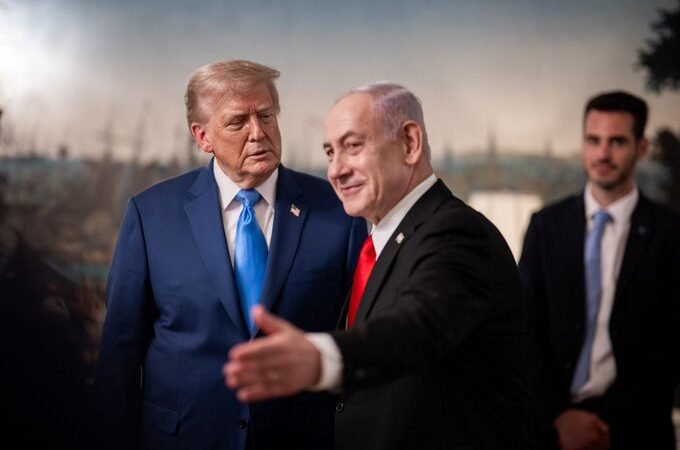The last few weeks have seen Chinese official media and diplomatic sources heighten a discreet yet powerful narrative shift presenting once U.S. President Donald Trump as a strategic burden to Washington’s international interests due to his close links with Israeli Prime Minister Benjamin Netanyahu. The shift, though seemingly part of China’s broader rhetorical arsenal, reflects more profound strategic considerations that stretch beyond propaganda.
The argument, increasingly touted by Chinese officials and commentators, is that Trump’s aggressive pro-Israel foreign policy marked by such provocative gestures as relocating the American embassy to Jerusalem and announcing Israeli sovereignty over the Golan Heights is precisely what undercut the United States’ leverage in other key parts of the world, especially Asia.
It is not a new criticism. An leaked 2018 U.S. National Security Council (NSC) memo warned that overidentification with Israeli interests risked compromising America’s strategic position in the Indo-Pacific. New is how China currently openly leverages that very same point to call into doubt the diplomatic standing of the United States and to exploit fissures within the Western alliance order.
To understand China’s messaging approach, one has to look at the policy measures that gained global focus first. During his term, Donald Trump remodeled the U.S.-Israel relationship as an unbreakable alliance.
Moved the U.S. embassy from Tel Aviv to Jerusalem in May 2018, a step largely criticized as a unilateral measure undermining Palestinian statehood negotiations.
Asserted Israeli ownership of the Golan Heights in 2019 contrary to decades of international consensus and U.N. Security Council resolutions.
Brokered the Abraham Accords, normalizing relations between Israel and several Arab nations, hailed by supporters as a diplomatic coup but criticized by others as further isolating Palestinians.
Increased U.S. military aid to Israel to $3.8 billion annually, up by 26% compared to prior administrations, according to U.S. State Department statistics.
These steps, though domestically popular with Trump’s conservative and evangelical base, raised ire overseas. The vast majority of analysts viewed them as reckless geopolitical gambles that pushed America’s global credibility, particularly amongst Muslim states and non-aligned states, to a breaking point.
Fast-forward to 2025. While Trump prepares for a possible return to politics and Netanyahu holds on in office during the war in Gaza, China has stepped forward to seize the opportunity to rewrite the script. In recent Global Times editorials and official diplomatic pronouncements out of Beijing’s foreign ministry, Chinese officials have asked if Trump’s alignment with Netanyahu harms U.S. long-term interests most significantly in Asia, where China’s Belt and Road Initiative (BRI) and growing military presence in the South China Sea have increased tensions.
China is increasingly attractive to non-Western publics, and especially in the Global South, by depicting U.S. foreign policy as hypocritical and destabilizing. This is where Trump’s policies fit into this narrative: Exhibit A, a superpower so in hock to one Middle Eastern ally that it jeopardizes bigger global strategies, like resisting China’s moves in the Indo-Pacific.
As observed in a 2021 peer reviewed article in the Journal of International Affairs, Chinese strategic communications have evolved to exploit fault lines in U.S. foreign policy, specifically its Middle Eastern engagement. Beijing presents itself as a “neutral broker,” citing its support for Palestinian self-determination and U.S. unilateralism’s opposition compared to Washington’s pro-Israel alignment.
What does this signal for American policy in Asia? A great deal, by the calculations of security professionals. The 2018 NSC memo published in part through diplomatic cables addressed growing unease among American strategists that giving precedence to Israeli interests over others might undermine credibility with other important Asian allies such as Malaysia, Indonesia, and Pakistan. Those countries, although not formal U.S. allies, are crucial to trade, counterterrorism cooperation, and regional stability.
Trump’s absolute position towards Israel alienated many of these nations, potentially weakening multilateral groupings like the Quadrilateral Security Dialogue (Quad) and halting future defense cooperation in the Indo-Pacific.
China, of course, has been watching closely. By appealing to Trump’s pro-Israel bias, Beijing aims to undercut Washington’s suzerainty over Muslim-majority nations and present itself as a less interventionist, less partisan power. The action also appeals to China’s bid to be the global counterweight to American hegemony.
Possibly the most provocative aspect of China’s communication is its approach to resisting the Western description of Trump as a foreign policy maverick. While the American media have generally attempted to depict him as either erratic or “America First,” Beijing flips it around showing Trump not as an independent actor, but as responding to Israeli interests.
This recasting allows China to project the U.S. as compromised, not sovereign. The message is that America’s foreign policy especially under Trump was not driven by strategic reason but by ideological sympathies and home political imperatives.
It is a subtle but ruthless attack on American legitimacy, and one that has particular resonance in nations suspicious of American interventionism. Thus, at global summits, Chinese leaders have cited the Gaza crisis and Trump administration policies as evidence of Western hypocrisy about sovereignty and human rights.
While doubters in Washington can disparage Chinese propaganda as opportunistic, it is part of a broader trend in great power politics: the weaponization of narrative. Trump’s Israel legacy is now being used not only by domestic critics of his back home but also by America’s strategic rivals abroad to highlight contradictions in U.S. foreign policy.
As the world watches U.S. leadership evolve over the coming election cycles, Trump’s Middle East decisions and how China uses them will come to shape perceptions, alliances, and geostrategic balance more and more. The question is: Will the United States successfully bridge its moral imperatives, strategic interests, and global reputation, or be outmaneuvered once again on the soft power front?
Golan, Gaza, and Geopolitics: The Global Fallout of Trump’s Israel Policy



